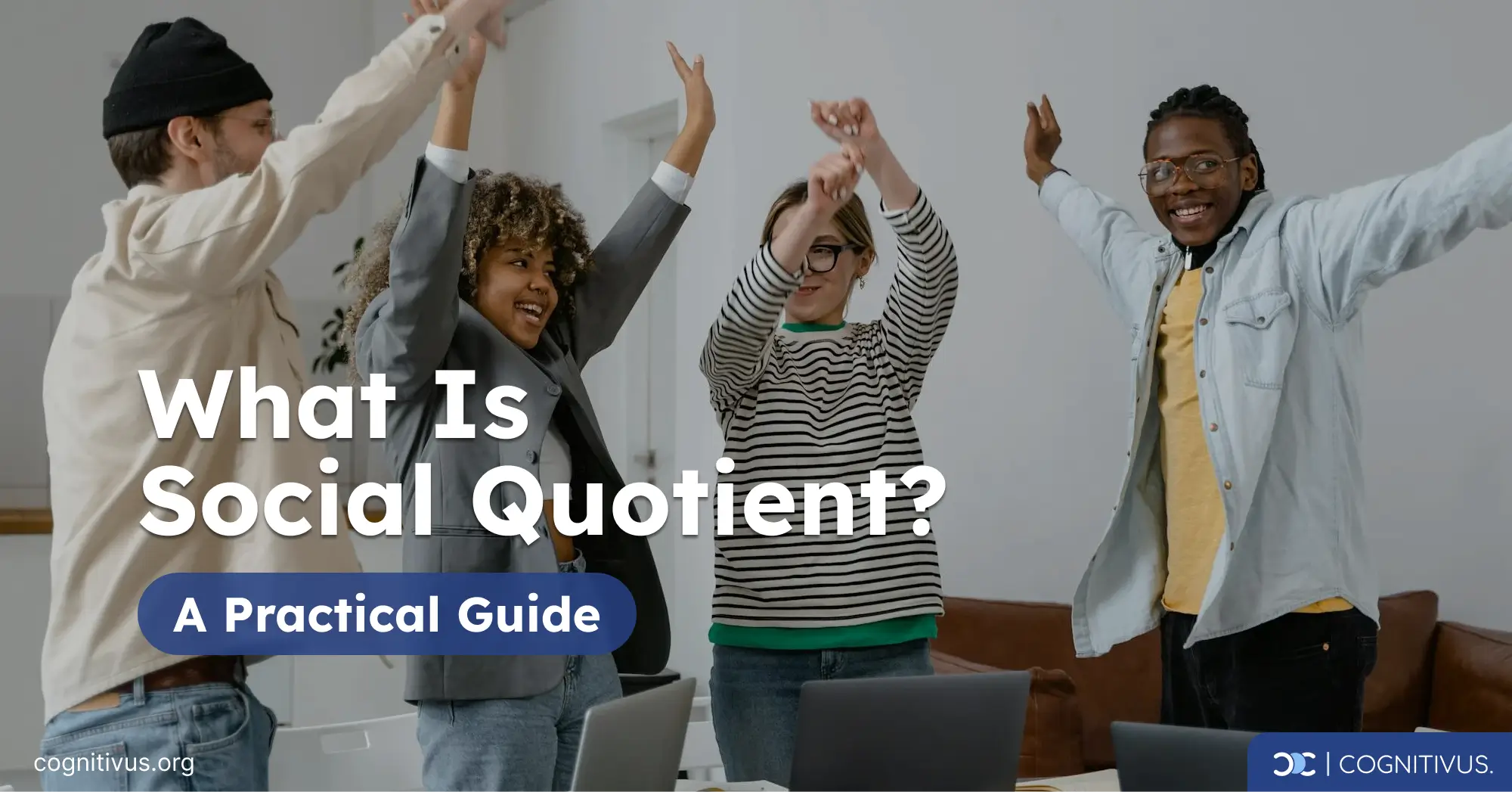What would you do if you didn’t have the skills to understand or interact with the people around you? You would probably struggle in social settings, and you’d find it incredibly challenging to achieve your goals and build authentic relationships. That’s because we all rely on social skills to communicate. This is where social quotient, or SQ, comes in.
Your social quotient represents how socially intelligent you are, which influences how you handle different social situations. These social skills, such as your ability to listen and empathize, are highly valued in society because we need them to collaborate and communicate with one another. If we don’t have these valuable skills, it can hinder achieving our personal and professional goals.
So, let’s learn all about social quotient, how to improve it, and why it’s necessary to work on your social intelligence skills as well.
1. What Exactly Is Social Quotient?
Definition of social quotient
Social quotient, also known as “SQ,” is what we use to measure a person’s social intelligence. Our social intelligence is defined as our ability to read social cues when we interact with other people, such as tone of voice, facial expressions, and overall body language. It’s what we use in everyday communication to listen to and understand others.
Remember that social intelligence shouldn’t be confused with general intelligence, or “IQ.” General intelligence involves the cognitive and analytical skills we use to gain practical knowledge, whereas SQ deals with human interaction and relationship dynamics.
Benefits of social quotient
Now that we know what social quotient is, how does it help us communicate and connect with our family, friends, and the people we meet for the first time?
To answer this question, we need to look at the role of social intelligence in navigating complex social landscapes. A study published in the American Journal of Orthopsychiatry revealed how social quotient relates to behaviors such as making basic conversations and whether others perceive you as likable in social situations. This means that the higher your social quotient, the easier it is for you to engage and connect with other people. When you’re relatable and easy to talk to, people like and trust you, which helps you build healthy relationships.
2. Social Quotient Test: How Is Social Quotient Measured?
Social intelligence is complex to measure. You only need to look at how we assess IQ to understand why. General intelligence (IQ) is measured on a standardized test focusing on quantifiable metrics such as mathematics, logical reasoning, spatial orientation, and sometimes language proficiency. SQ, on the other hand, focuses on interpersonal skills like communication and cooperation and requires a refined approach to determine how we work through various social challenges.
As you can tell, we cannot measure SQ in a standard way. Instead, practitioners use techniques such as observation and self-report questionnaires to determine overall social intelligence.
Let’s take a closer look at the strategies used to measure social quotient.
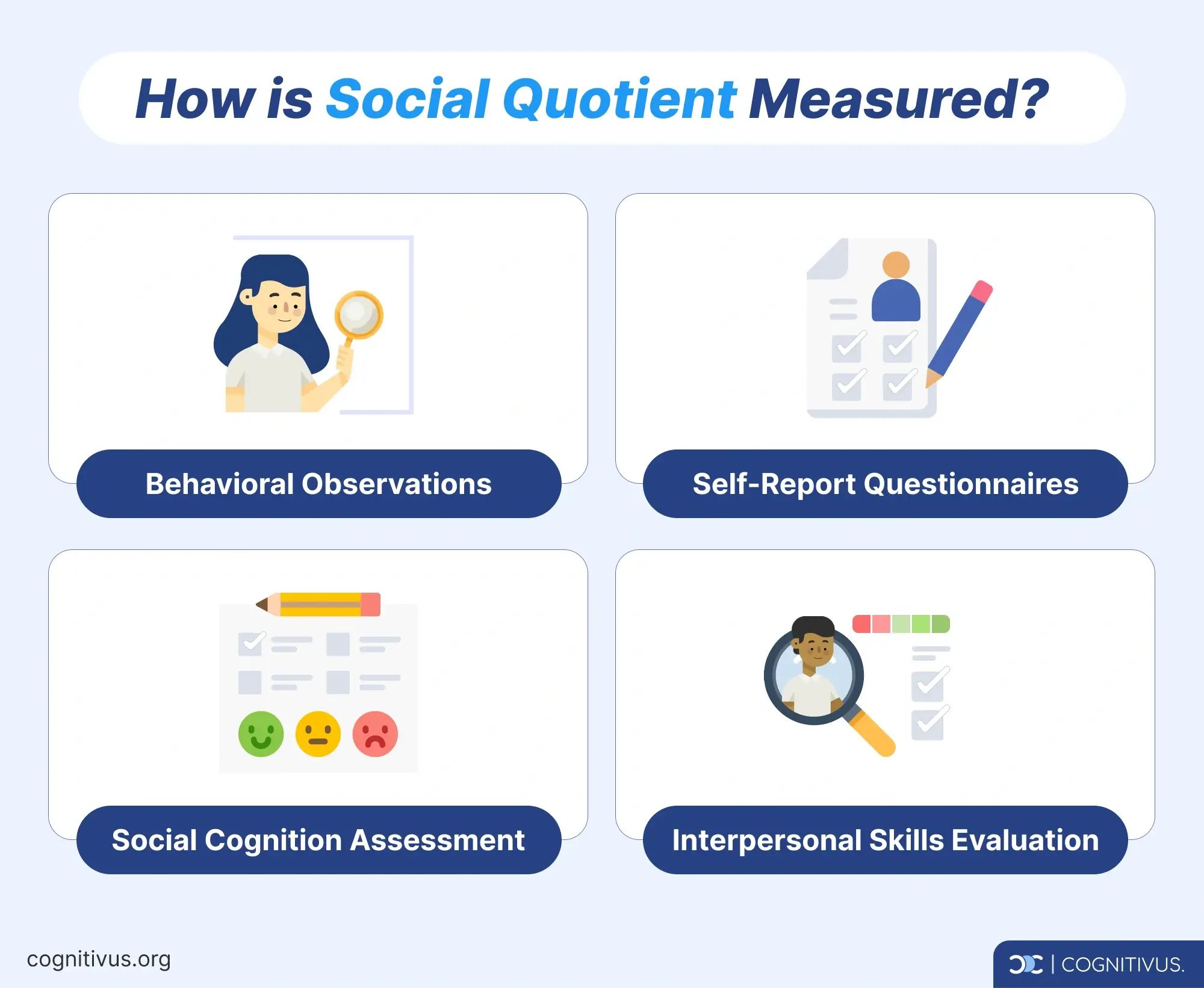
Behavioral observations in controlled environments
To understand SQ, psychologists must examine how one responds to social cues, engages with others, and handles different social dynamics. To achieve this, they carefully observe individuals in controlled social scenarios, which means that they recreate a real-life social interaction and determine how participants behave in these instances.
The observer will look for behaviors that indicate social intelligence. For example, they’ll determine whether the participant can pick up on non-verbal cues, show empathy, and adjust their communication style based on the context.
Self-report questionnaires
A self-report questionnaire measuring SQ is designed to ask how well you think you can handle social situations. Unlike behavioral observation, these questionnaires rely on the honesty of the test-taker to reveal what they would typically do in specific scenarios.
The questions explore factors such as your ability to maintain relationships and your level of empathy, which means understanding someone else’s emotions. The purpose of the report is to gain insight into the way you perceive your social skills, which is another part of your social intelligence profile.
Assessment of social cognition
A more structured approach to testing SQ is through an assessment of social cognition, which involves how you process and apply social information. Participants will complete tasks such as interpreting what is happening in a social scenario, predicting others’ reactions, or determining the most effective ways of resolving conflict. To get to the heart of social intelligence, psychologists focus on the cognitive process or reasoning that you use to understand various social interactions.
Interpersonal skills evaluation
To properly assess SQ, you cannot exclude interpersonal skills, which are how you communicate with others. This evaluation explores the way you initiate and maintain conversations, your ability to form and nurture relationships, and your effectiveness in managing social conflicts. In most cases, interpersonal skills are evaluated using a combination of controlled observation, self-reporting, and feedback from peers. These methods all serve to provide a clearer picture of your social capabilities.
3. The Difference between Social Intelligence and Other Types of Intelligence
We already know that our social intelligence isn’t the same as our general intelligence, but what about our emotional and interpersonal intelligence?
While this might seem a bit confusing at first glance, we make it easier to understand by breaking down the different types of intelligence and how they compare to SQ.
3.1 Social intelligence vs. emotional intelligence
Despite being discussed in the same breath, social intelligence and emotional intelligence are distinct, yet complementary, types of intelligence. Think of them as being independent but ready to join forces when dealing with your own or someone else’s feelings in social situations.
We can define emotional intelligence, or “EQ,” as your ability to recognize and manage your emotions. So how exactly does this complement SQ?
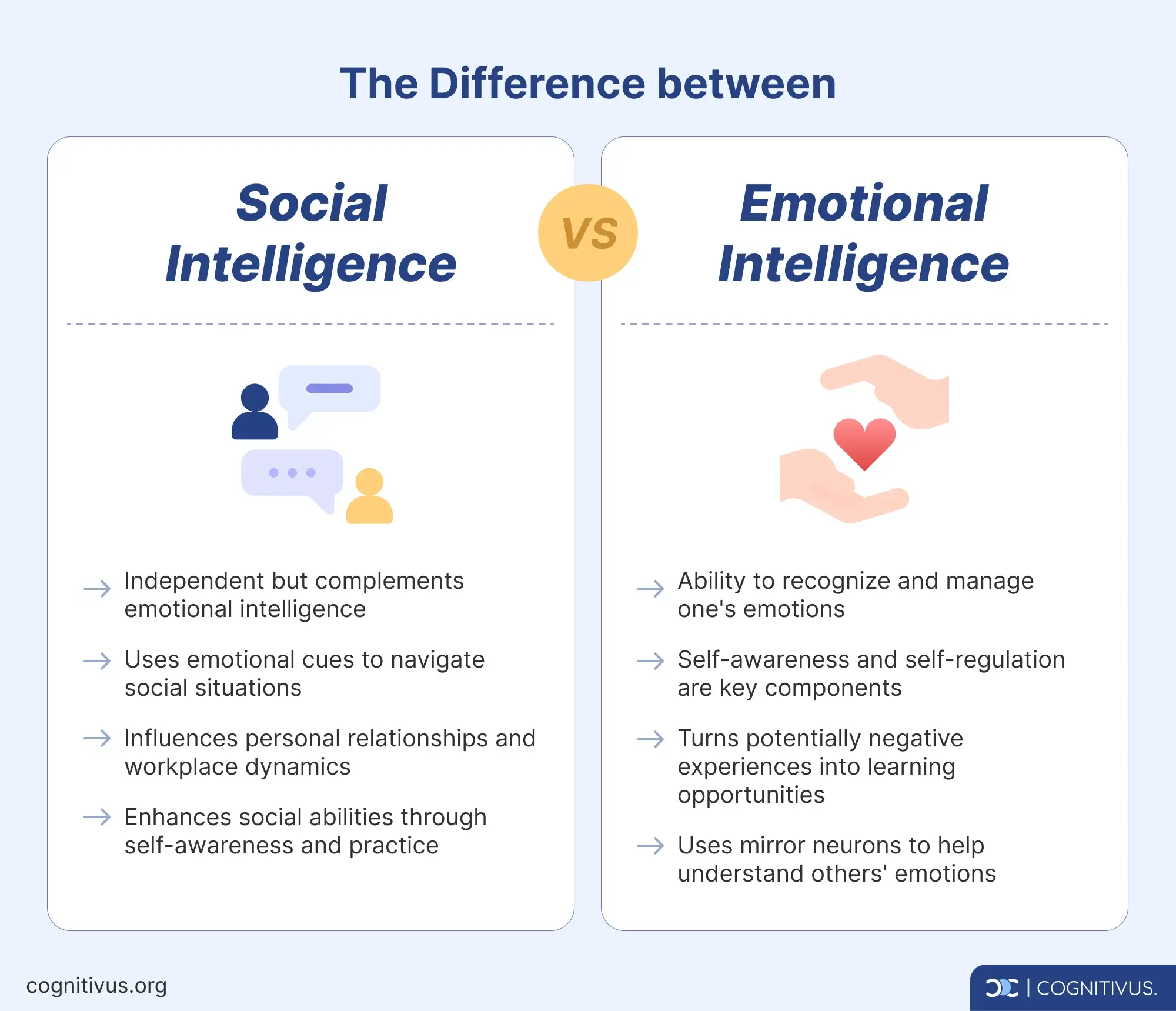
Let’s consider the following scenario:
You start your usual work day only to be called into your manager’s office to receive unexpected criticism. Instead of reacting defensively, you take a moment to process your emotions. You recognize your initial feelings of disappointment and frustration but decide to approach the situation with curiosity and an open mind.
This leads to seeking clarification and constructive feedback.
In this instance, your ability to manage your emotions (i.e., your emotional intelligence), turned a potentially negative experience into a learning opportunity.
Your self-awareness and self-regulation in this example are considered the hallmarks of high emotional intelligence. In this case, we would use our emotional intelligence to resonate with others and our social intelligence skills to apply the social rules and skills we need to interact with friends, family, and strangers.
Perhaps an example of social intelligence can paint a clearer picture:
Think of a team project where the tension between the members hinders collaboration. When someone with a high level of social intelligence observes the team’s interactions, they notice that this tension is attributed to unspoken concerns. They host a team meeting where everyone feels safe enough to voice their opinions and concerns respectfully and constructively. You could call this “addressing the elephant in the room,” which helps create new goals and realistic expectations. In this way, the socially intelligent individual restores the harmony and efficiency of the team.
Daniel Goleman, a pioneering psychologist and thought leader, has done extensive research on both types of intelligence. He highlights how they influence everything from personal relationships to workplace dynamics. He concludes that we use emotional intelligence to read and express emotions, while social intelligence uses these cues to skillfully navigate different social scenarios.
Goleman goes on further to explain this concept using neuroscience. He states that mirror neurons play a role in how we relate to others. These neurons help us mimic and understand the feelings of the people around us. This means that social intelligence has a biological basis and shows how our brains are developed for socialization. It also means that we can enhance our social abilities through self-awareness and practice, as described in an article published by Harvard Business Review.
3.2 Social intelligence vs. social awareness
Social awareness is a crucial part of our social intelligence and is described as our innate ability to “read the room.” This means you can understand the unspoken language and dynamics of the people around you and respond with tact and sensitivity.
When you’re this perceptive, you can easily detect subtle social cues such as facial expressions and tone of voice. You can then use these cues to engage in meaningful interactions with others.
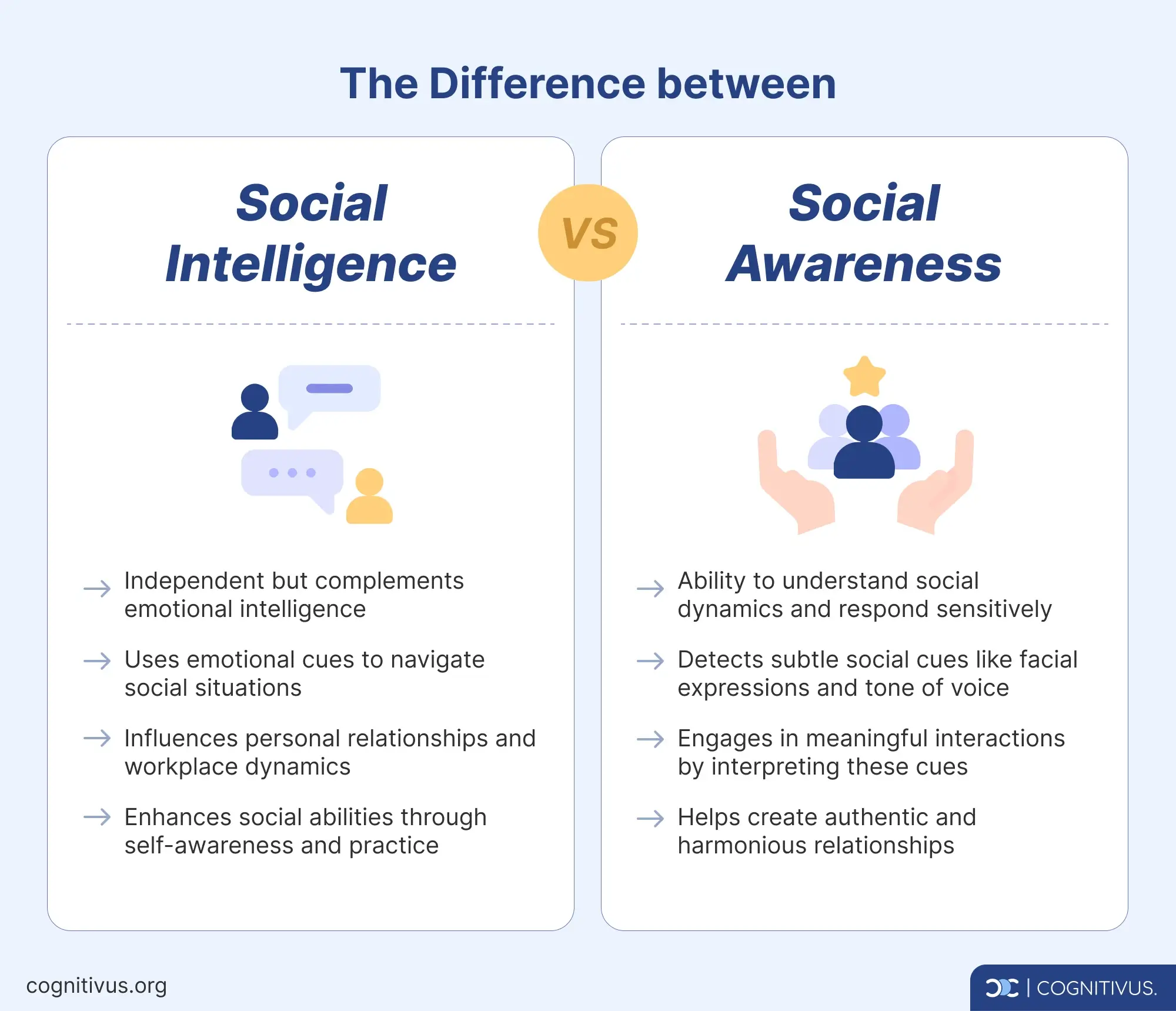
To better understand what social awareness is about, consider the following example:
At a family gathering, you notice that one of your relatives seems more withdrawn than usual. They’re barely speaking and avoiding eye contact. Drawing on your social awareness, you sense they might be feeling out of place or upset. Later, when you’re speaking to them privately, you ask if everything is okay and let them know that they can share their thoughts and feelings with you.
Because you read the necessary social cues in this situation, you could support your family member and strengthen the relationship.
Social awareness is something that we come across every day. More often than not, you might be unaware of the fact that you’re constantly trying to figure out someone’s feelings and intentions by examining their body language and tone of voice. Your interpretation of these cues will shape your behavior and establish your social role.
If you have a high level of social awareness, you can easily change your behavior to make others feel relaxed in your presence. In other words, your ability to interpret social cues helps you create authentic and harmonious relationships.
3.3 Social intelligence vs interpersonal intelligence
Like social awareness, interpersonal intelligence is also a component of social intelligence. It involves the application of social awareness, which is understanding and effectively engaging with others.
This type of intelligence is key to successful communication because it allows us to process others’ emotions and provides us with the skills to positively interact with people.
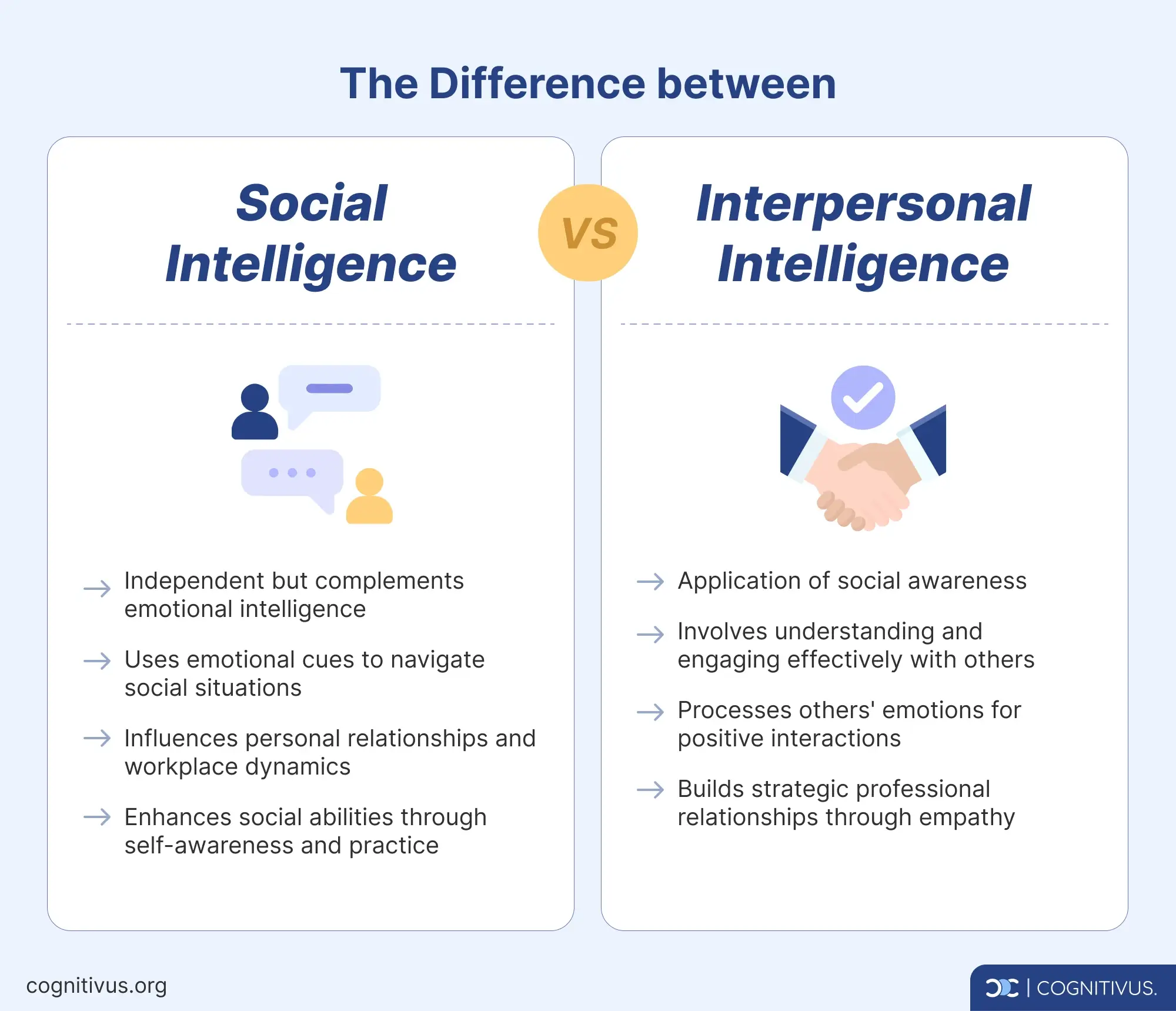
Let’s consider the application of interpersonal intelligence in an example we discuss below:
While working on a team project, you notice that one of the members is becoming increasingly withdrawn. Relying on your interpersonal intelligence, you invite them for a private chat in which you express your appreciation for their hard work. At the same time, you ask why they’ve become so distant and disengaged.
They inform you that they’ve been feeling undervalued, so you decide to work with them in areas requiring their expertise. Once they’re comfortable enough to collaborate with the rest of the team, you notice that their morale is boosted and they can contribute to the project.
Here we see just how powerful empathic engagement is and how interpersonal intelligence can help build strategic professional relationships.
When we are sensitive to the needs of others, we can comprehend different perspectives and interact more effectively with them.
4. What Are the Signs of High and Low Social Intelligence?
The biggest question is, how do you know where you rank on the social intelligence scale? Well, the best way to do this is to familiarize yourself with the signs of high and low intelligence.
If you notice there’s room for improvement, you can take healthy steps toward building those all-essential social skills.
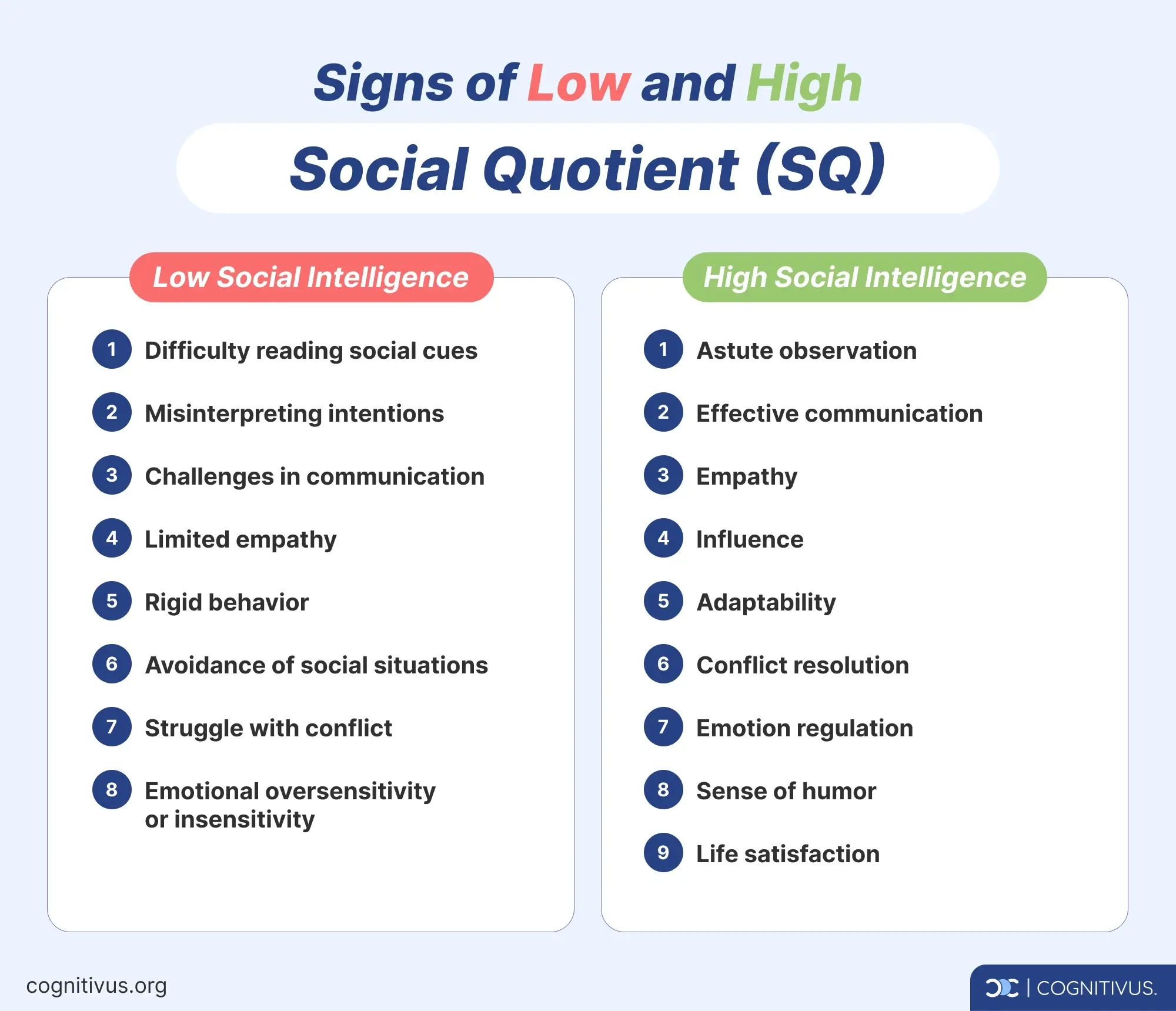
9 signs of high social intelligence (SQ)
People with high SQ are seen as trustworthy, genuine, and empathic people who can make good conversation and easily connect with their peers. The signs and traits of high social intelligence can help you determine whether you’re on the right track.
- Astute observation
People with high SQ can pick up on verbal and non-verbal forms of communication that others might overlook. - Effective communication
They have superior communication skills, allowing them to express their ideas, actively listen, and facilitate meaningful discussions. - Empathy
They can identify the emotions of others and resonate with them, which is a sign of high emotional intelligence that we use when communicating with others. - Influence
Their unique understanding of people and situations helps them influence social outcomes. For example, they can positively steer a conversation or address group dynamics to improve communication and build authentic connections. - Adaptability
High SQ individuals are adaptable, which allows them to change their behavior and responses to suit different social contexts. - Conflict resolution
They’re excellent at addressing conflict through mediation, which means finding common ground between individuals with different viewpoints. - Emotion regulation
A sure sign of high social intelligence is the ability to control one’s emotions, which means thinking before speaking and acting. - Sense of humor
A good sense of humor is important when working through awkward social situations because it “breaks the ice” and builds rapport. This is a common trait amongst people who have a high social quotient. - Life satisfaction
Individuals who have high SQ have a sense of humor and self-awareness, making it easier to regulate their emotions and moods. They tend to experience greater life satisfaction compared to those who lack these abilities.
Based on a 2020 study by psychology researchers, emotional regulation, humor, and life satisfaction are the top three predictors of an above-average SQ.
8 signs of low social intelligence (SQ)
If you feel overwhelmed in social situations or struggle to stop yourself from lashing out at others, you may need to work on your level of social intelligence. That's because individuals with low SQ usually have traits that hinder effective and rewarding social interactions.
A closer look at the signs of low social intelligence can help you make positive changes in your life.
- Difficulty reading social cues
People with low SQ find it hard to understand someone else’s body language, tone of voice, and other non-verbal signals. This can often lead to conflict or poor communication because they can’t pick up on social dynamics. - Misinterpreting intentions
Because they misread social cues, people with low social quotient don’t interpret another person’s words or actions correctly, which leads to confusion or conflict. - Challenges in communication
Their communication might be unclear or inappropriate for the context, making interactions awkward or strained. - Limited empathy
Low SQ individuals might lack understanding or consideration for others' feelings and viewpoints. - Rigid behavior
People who lack social intelligence struggle to adapt to different social contexts. Their rigid behavior gives them a sense of control or predictability, but this can lead to frustration and even depression when things don’t go their way. - Avoidance of social situations
Individuals with low SQ typically avoid being social because it makes them feel self-conscious and uncomfortable. Unfortunately, missing out on social activities stops one from learning essential skills, building meaningful relationships, and achieving life satisfaction. - Struggle with conflict
Because they misread non-verbal and verbal cues, people with low SQ find it challenging to manage conflict. In relationships, poor conflict resolution skills can create frustration and anger, escalating situations unnecessarily. - Emotional oversensitivity or insensitivity
Typical signs of low social intelligence are overreactions to social stimuli, such as someone’s expressions or gestures. They may also show no interest in situations that generally elicit emotional reactions.
If you think that you have low SQ, there are ways to improve this type of intelligence by practicing social skills and asking for feedback concerning your communication from friends and family. For those who aren’t sure where to start, a professional psychologist can guide and teach you essential social skills, allowing you to work towards your goals and dreams.
5. How to Boost Your Social Quotient
There are no two ways about it; we need social skills to succeed in life. Whether that involves improving our daily communication or managing our emotions, social intelligence is necessary to understand others.
What we know so far is that increasing your social quotient can improve the quality of your interactions by helping you build strong and meaningful relationships grounded in respect.
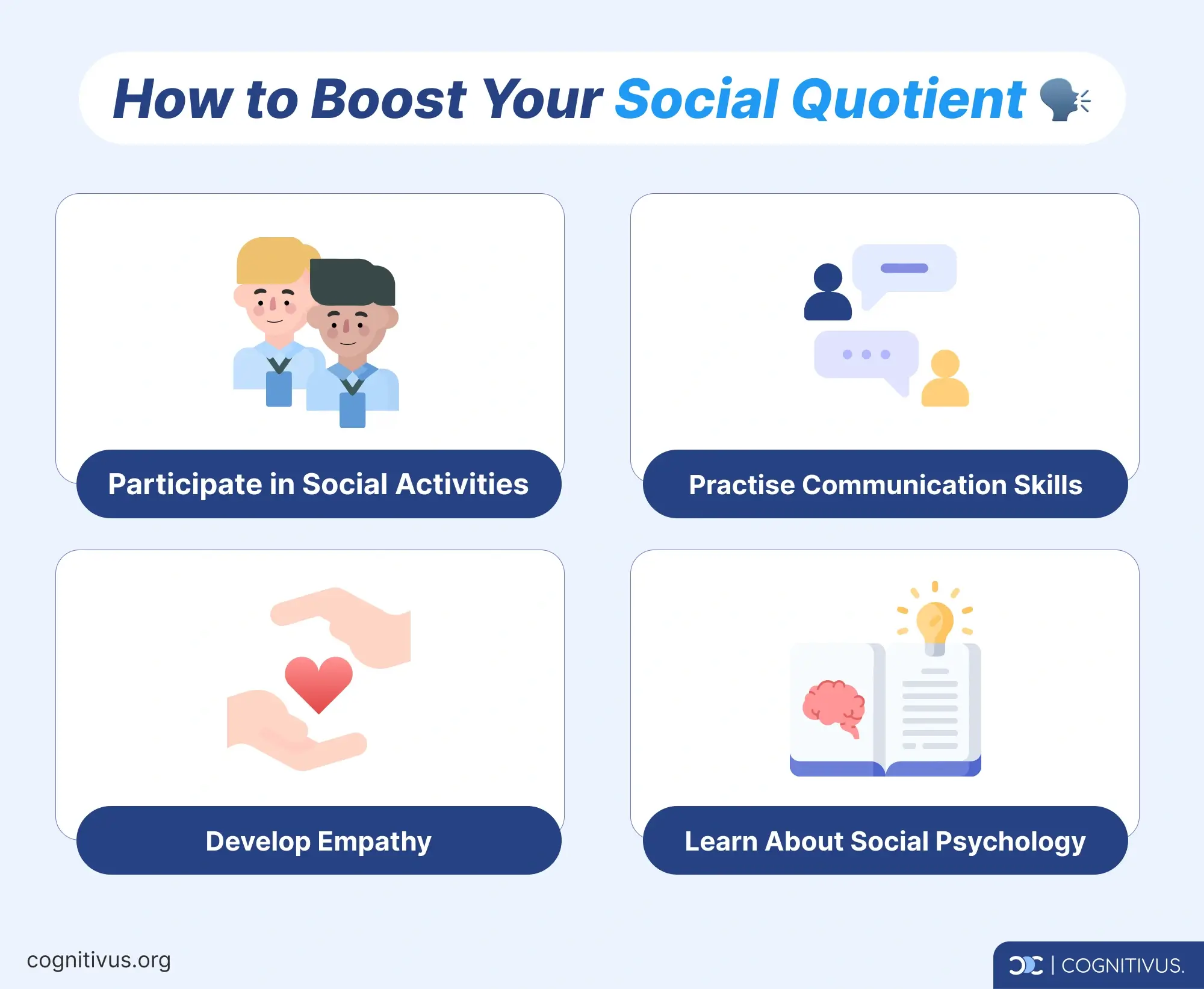
There’s no better time than the present to learn how to boost your social skills, so let’s take a look at the steps you can take to increase your SQ.
Practice good communication skills
A great way to boost your SQ is to practice your communication skills. The more you talk to other people, the easier it is to articulate your thoughts and ideas. It also helps you actively listen to others. You can practice communication skills by showing genuine interest in conversations. Ask questions, maintain fair eye contact, and provide thoughtful responses. This will enrich your dialogue and go a long way toward strengthening your connections with others.
Develop empathy
If you want a high SQ, you’ve got to have empathy. So, if you’re lacking in this area, you can improve your level of empathy by making a sincere effort to understand and appreciate the perspectives of others. Adopting this type of empathic approach helps you form deeper emotional connections, which makes it easier to socialize. If you’re struggling with improving your level of empathy, try to put yourself in the other person’s shoes, and not only will you see things from their standpoint, but you’ll also be able to resonate with how they feel.
Participate in social activities
If you want to be more socially intelligent, it’s important to put yourself out there. By this, I mean going to clubs, participating in social groups, or seeking activities that suit your lifestyle. Joining a cooking or art class is also a good way to meet and interact with people. These environments allow you to practice and refine your social skills in real-world settings. You can learn different styles of interaction by paying attention to the way others communicate, further improving your knowledge of social dynamics.
Learn about social psychology
Another excellent way to expand your social awareness is to find books, articles, and studies involving social psychology. Observational learning is another great strategy, and you can do this by watching movies, attending workshops, or even observing interactions between people in public spaces. This should give you insight into complex social behaviors that you can use in general conversation or more challenging interactions like conflict resolution.
Debunking the Myths Around Social Intelligence
When you’re ready to work towards improving your SQ, start by debunking the misconceptions surrounding social intelligence so that you can better understand its purpose and how to apply it in your life.
One misconception I have to debunk is that social intelligence, or SQ, has nothing to do with mental, physical, or financial health. The truth is that social intelligence is applied in every aspect of communication, from reading emotions to pursuing relationships, which are important in managing stress. In the workplace, a healthy set of social skills helps you with communication and team collaboration, all of which are necessary for professional and economic success.
Another point to consider is that you aren’t born with social skills. It’s something you can learn and practice, regardless of your IQ level. This is emphasized by Daniel Goleman, who advocates that everyone can improve their social abilities through focused effort and education.
In Conclusion
SQ represents our social intelligence, and while it may not be as popular as traditional IQ, it’s absolutely necessary to live a functional, practical, and rewarding life. The way we relate to other people and connect with them on an emotional and social level relies on our ability to pay attention to what they say and how they say it.
Not only can a high social quotient help you communicate more confidently and clearly, but it also helps you build strong relationships because you can relate to someone else on an emotional level.
Remember that communication is both verbal and non-verbal, so your ability to understand another person’s mood or stance relies on reading facial expressions and body language, which are subtle social cues.
To improve your social quotient, you can apply the strategies mentioned above to help you learn and grow. The more you practice, the sooner you’ll notice an improvement in your social interactions.
You’ll also find that as your SQ increases, your personal and professional lives become more fulfilling and successful. It might take some work, but just remember that building your social skills can lead to valuable experiences and opportunities, ultimately contributing to a richer, more connected life.

